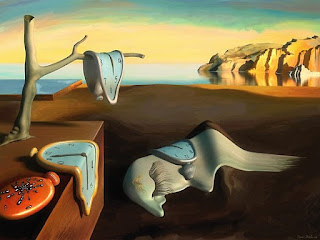What is time?
Classical mechanics takes time as something fundamental in the universe, although this is obviously just for the sake of calculation. Classical mechanics would never query what time itself is, and possibly no branch of physics is able to answer this either. It's almost like asking 'what is mass?'. This is a question for philosophy more than anything else; it takes a scientist to handle a concept, but a philosopher to define it from its first principle.
Einstein showed that our perception of time is relative, with his famous thought experiment of the lightning bolts and the train. However, the fact that there is a sequence of events to perceive in the first place (even though another person may perceive the same events in a different order) shows that there is something fundamental about time. Otherwise there would not be any 'sequence' to perceive in the first place.
Perception is limited, because a human being only perceives the events that reach him in a specific order, since he himself is another object in the universe and is therefore moving relative to all other objects. But as stated above, the fact that there is something to perceive already proves there must be something fundamental; no matter where you are in the universe, there will always be a sequence of events.
That 'something' fundamental is this: change.
Imagine the universe was a finite cube, where there is no light and no matter except for a doll's house right at it's centre. This doll's house is made up of a 'special' kind of matter, where (in this alternate universe), nothing moves. Not even electrons in their shells.
Would this doll's house experience time?
Would there be time in this universe?
The logical answer seems to be 'no', because there is no change, and no sequence of events is possible.
Using this thought process, time appears to be defined as the displacement of matter according to a 'before' and 'after'. If there was never a displacement of anything, there would be no change, and thus no time.
We can redo this thought through a more familiar perspective of the universe:
Imagine all of a sudden God decides to mess with the universe and everything just freezes. The photon that was coming on it's way from the sun to the Earth just freezes where is in space. The Earth freezes it's orbit around the sun, and all humans freeze with what they were doing. It's as if the universe was a photograph, in which all motion and processes, macroscopic and microscopic, just freeze.
Now that everything is frozen like a photograph, how are we to quantify for how much time we're frozen? It would be an absurdity to say "we've been frozen for forty years", because now that the Earth isn't going around the Sun in it's yearly orbit, there is no way to quantify what a "year" even means. It would also be absurd to say we've frozen for "a second", or "a century" or "a millennium". In fact, when God decides to unfreeze all of us, we would all carry on as usual what we were doing before he froze us, because that 'freezing' would feel instantaneous for us: because time itself stopped.
Without change, there is no time, because there is no displacement according to a 'before' and 'after'. Time is the human way that has been devised to quantify the change that surrounds us.
Clearly, the doll house and photograph universe thought isn't too practical, since we are in a continuously changing universe, being changing beings ourselves and we have discovered laws that apply in a universe assuming time (or change) is fundamental, such as the laws of thermodynamics.
Even so, it's eerie to think that time is just the change around you, and not the fundamental digits shown to you by a watch.




Comments
Post a Comment